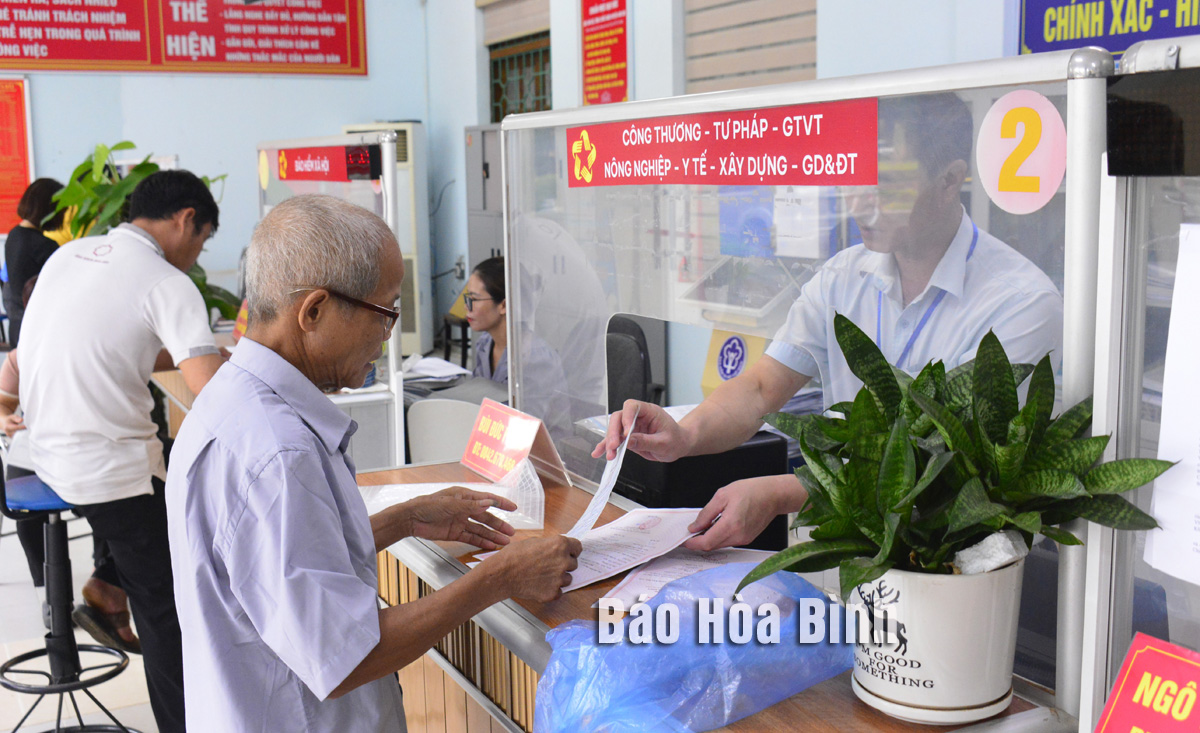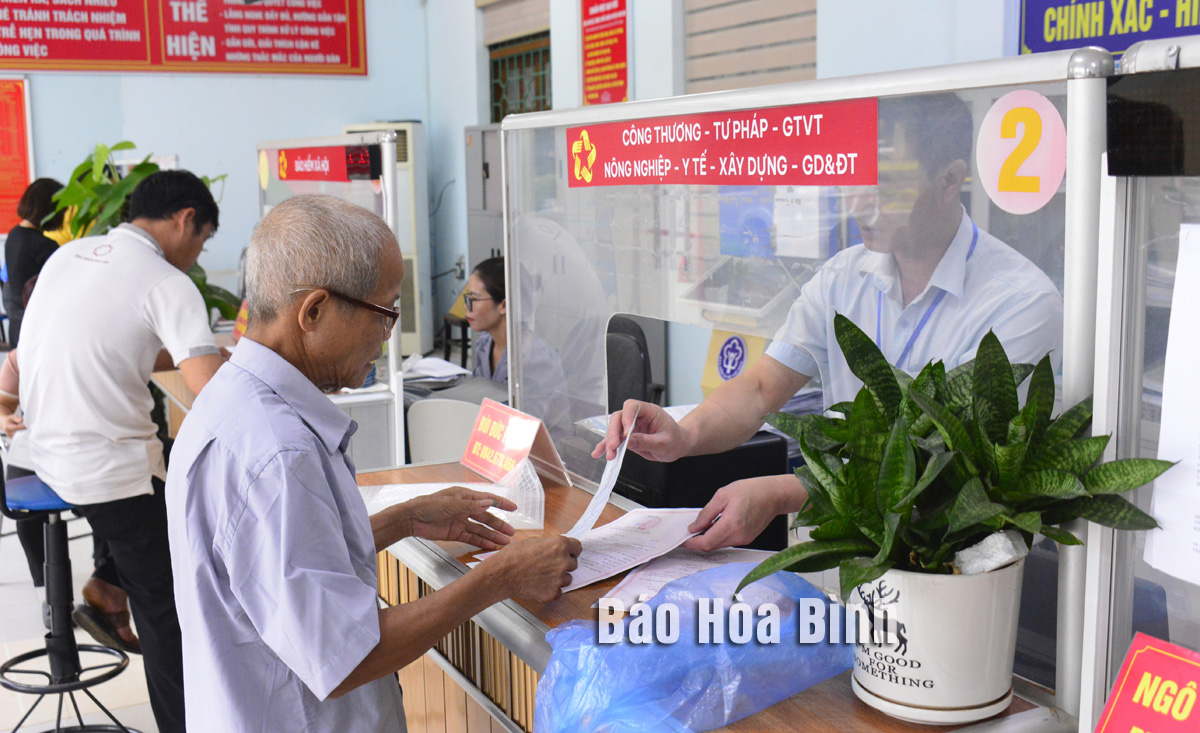
Kim Boi district of Hoa Binh province has thoroughly implemented and adhered to Resolution No. 18-NQ/TW on restructuring the organisational apparatus of the political system towards a streamlined, efficient, and effective direction, ensuring no disruption of work.

People conduct
transactions at the single-window unit of the Kim Boi district People's
Committee.
Kim Boi is one of the pioneering localities in implementing
the organisational restructuring policy under Resolution No. 18-NQ/TW. In 2020,
following Resolution No. 820 of the National Assembly Standing Committee, Bo
town expanded in terms of area and population after incorporating the entire
natural area and population of Ha Bi and Kim Binh communes.
To date, the payroll of Party agencies and mass
organisations at the district level has followed the planned streamlining
process, with the current number of 53, a reduction of four compared to 2017.
As of November 30, 2024, the district had reduced 16 public service units
compared to 2017. After the restructuring, the district now has 17
administrative units at the commune level (down from 28 in 2017), and 158
villages, hamlets, and residential areas (45 fewer hamlets).
Following the restructuring, the localities have promptly
reorganised their apparatus, ensuring efficient leadership, management, and
administration at the local level. There was no disruption in the leadership
and management between the old and new administrative units. The restructuring
of the administrative units has made the apparatus leaner and more efficient,
reduced the number of commune-level civil servants, and non-professional staff
at the villages, leading to a reduction in salary and allowance expenditures,
and saving funds for development investment. By November 30, 2024, the district
People's Committee had had 218 commune-level staffs streamlined.
Along with other localities in the province, on February 14,
Kim Boi completed the reorganisational apparatus of the political system. The
district Party Committee’s Board for Information and Education and Board for
Mass Mobilisation were merged into the Board for Information and Education,
Mass Mobilisation. It also reorganised specialised agencies under the district
People's Committee as per regulations. Five Party cells were dissolved, two
were established, and three were renamed to align with the new structure.
Secretary of the district Party Committee Nguyen Hoang Thu,
said that the restructuring of the organisational apparatus is an inevitable
requirement to enhance the Party's leadership capacity and combat
effectiveness, but it is also a difficult task that requires unity,
determination, and a high sense of responsibility from all officials and Party
members. The Standing Board of the district Party Committee is focusing on
directing Party committees and organisations, agencies, and units to quickly
implement the new organisational model.
At the same time, Kim Boi is reviewing and supplementing the
working regulations, clearly assigning tasks to ensure unity and effectiveness,
ensuring no gaps in the operation of agencies and units, Thu added.
In the spirit of "Party members go first, the people follow”, all households of Party members in the Doan Ket sub-region in Da Bac town, Da Bac district, voluntarily removed gates and fences, and donated land when the road expansion project passed through their properties. Inspired by their example, 68 households in the sub-region quickly followed suit, contributing over 1,400 sq.m of residential and perennial cropland to widen the main road through the residential area. The exemplary role of Party members in Doan Ket stands as a shining example of studying and following President Ho Chi Minh’s thought, morality, and lifestyle.
The Hoa Binh provincial People's Committee held a monthly meeting on May 29 to assess the implementation of socio-economic development tasks in the first six months of 2025, the progress of key projects, and some other important issues.
During his lifetime, President Ho Chi Minh always expressed his deep affection and special concern for children and youth. He once emphasized: "Caring for and educating children well is the responsibility of the entire Party and the entire people”; "First of all, the family (i.e. grandparents, parents, siblings) must do this job well”. "the Party Committees…, the Children’s Committee, the Youth Union, the education sector, and all related organizations must have specific plans to ensure children grow healthier and more progressive”. His teachings has been remaining valuable and serving as the guiding principles in the work of protecting, caring for, and educating children. In line with this ideology, Hoa Binh Province has continuously been prioritizing and investing resources in the well-being of children in recent years.
Mr. Nguyen Phi Long, the alternate Member of the Party Central Committee and Secretary of the Provincial Party Committee chaired the meeting of the Standing Committee of the Provincial Party Committee to provide opinions on several investment projects within the province. There was the attendance of Ms. Bui Thi Minh, the Permanent Deputy Secretary of the Provincial Party Committee and Chairwoman of the Provincial People’s Council; Mr. Bui Đuc Hinh, the Deputy Secretary of the Provincial Party Committee and Chairman of the Provincial People’s Committee and other members of the Standing Committee; the leaders from other departments, agencies, and some localities.
The Standing Board of the Vietnam Fatherland Front (VFF) Committee of Hoa Binh province held a meeting on May 28 to honour outstanding village elders, village heads, and reputable individuals from local ethnic minority and religious communities.
In mid-May, the provincial Museum organised an exhibition named "Duoi la co Dang Cong san Viet Nam quang vinh” (Under the flag of the glorious Communist Party of Vietnam). This meaningful activity took place in the joyful atmosphere to celebrate the country's major holidays and the Party congresses at all levels for the 2025-2030 term, towards the 14th National Party Congress.



